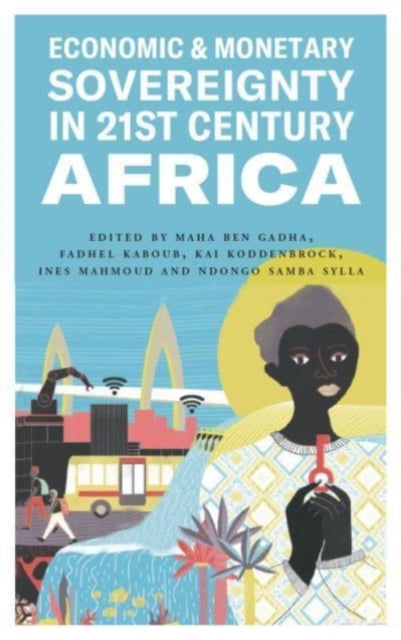Shulph Ink
Economic and Monetary Sovereignty in 21st Century Africa
Economic and Monetary Sovereignty in 21st Century Africa
YOU SAVE £2.15
- Condition: Brand new
- UK Delivery times: Usually arrives within 2 - 3 working days
- UK Shipping: Fee starts at £2.39. Subject to product weight & dimension
Bulk ordering. Want 15 or more copies? Get a personalised quote and bigger discounts. Learn more about bulk orders.
Couldn't load pickup availability
- More about Economic and Monetary Sovereignty in 21st Century Africa
Over forty years after the formal end of colonialism, Western financial systems continue to prevent African countries from achieving monetary sovereignty. Economic and Monetary Sovereignty in 21st Century Africa explores the recent history of African monetary and financial dependencies and how African nations are resisting colonial legacies. It offers a comprehensive, comparative, and historical look at how African societies have attempted to increase their policy influence and move beyond neoliberal orthodoxy and US-dollar dependency.
\n Format: Paperback / softback
\n Length: 336 pages
\n Publication date: 20 December 2021
\n Publisher: Pluto Press
\n
Over four decades since the formal end of colonialism, African countries continue to face debilitating ties to Western financial systems, hindering their ability to achieve true monetary sovereignty. In Economic and Monetary Sovereignty in 21st Century Africa, the author delves into the recent history of African monetary and financial dependencies, exploring the ways in which African nations are striving to break free from the colonial legacies that have held them back. Employing a comparative and multidisciplinary approach, the book uncovers the factors that led to the decline of the Pan-African approaches that characterized the early stages of independence and how most African economies succumbed to the strict neoliberal policies of the IMF, World Bank, and the EU.
This collection is a groundbreaking effort, offering a comprehensive, comparative, and historical examination of how African societies have sought to enhance their policy influence and transcend the confines of neoliberal orthodoxy and US-dollar dependency. It is a must-read for anyone interested in the African quest for self-determination in a world characterized by recurring economic and financial crises.
The book begins by tracing the origins of African monetary and financial dependencies, examining the historical legacies of colonialism, imperialism, and neocolonialism that have shaped the economic and political landscape of the continent. It highlights the ways in which these legacies have perpetuated economic inequality, poverty, and underdevelopment, while also undermining African countries' ability to control their own economies.
The author then explores the various strategies that African nations have employed to resist these dependencies. They discuss the role of regional economic integration, such as the African Union and the East African Community, in promoting economic cooperation and reducing trade barriers. They also examine the efforts of African governments to develop their own financial institutions, such as central banks and stock exchanges, to increase their financial autonomy and reduce their reliance on Western financial systems.
However, the book also acknowledges the challenges that African countries face in achieving economic and monetary sovereignty. It highlights the power of international financial institutions, such as the IMF and the World Bank, in imposing their policies on African countries and the resistance that African governments have faced in challenging these policies. It also explores the political and economic interests of Western countries in maintaining their dominance over African economies, including the use of aid, trade agreements, and military interventions to maintain stability and control.
Despite these challenges, the book remains optimistic about the future of African monetary and financial sovereignty. It highlights the resilience and creativity of African societies in adapting to the changing global economic landscape and the growing international recognition of the importance of African economies. It calls for a more equitable and sustainable approach to development, one that prioritizes the needs and interests of African countries and promotes inclusive growth and social justice.
In conclusion, Economic and Monetary Sovereignty in 21st Century Africa is a vital contribution to the study of African economics and politics. It provides a comprehensive and nuanced understanding of the challenges and opportunities facing African countries in their quest for economic and monetary sovereignty. By examining the historical roots of African dependencies, the strategies employed by African nations to resist these dependencies, and the political and economic interests of Western countries, the book offers valuable insights into the complex dynamics of African economies and the ongoing struggle for self-determination. This book is essential reading for anyone interested in the African quest for self-determination in a turbulent world of recurring economic and financial crisis.
\n Weight: 332g\n
Dimension: 137 x 215 x 28 (mm)\n
ISBN-13: 9780745344072\n \n
This item can be found in:
UK and International shipping information
UK and International shipping information
UK Delivery and returns information:
- Delivery within 2 - 3 days when ordering in the UK.
- Shipping fee for UK customers from £2.39. Fully tracked shipping service available.
- Returns policy: Return within 30 days of receipt for full refund.
International deliveries:
Shulph Ink now ships to Australia, Belgium, Canada, France, Germany, Ireland, Italy, India, Luxembourg Saudi Arabia, Singapore, Spain, Netherlands, New Zealand, United Arab Emirates, United States of America.
- Delivery times: within 5 - 10 days for international orders.
- Shipping fee: charges vary for overseas orders. Only tracked services are available for most international orders. Some countries have untracked shipping options.
- Customs charges: If ordering to addresses outside the United Kingdom, you may or may not incur additional customs and duties fees during local delivery.


